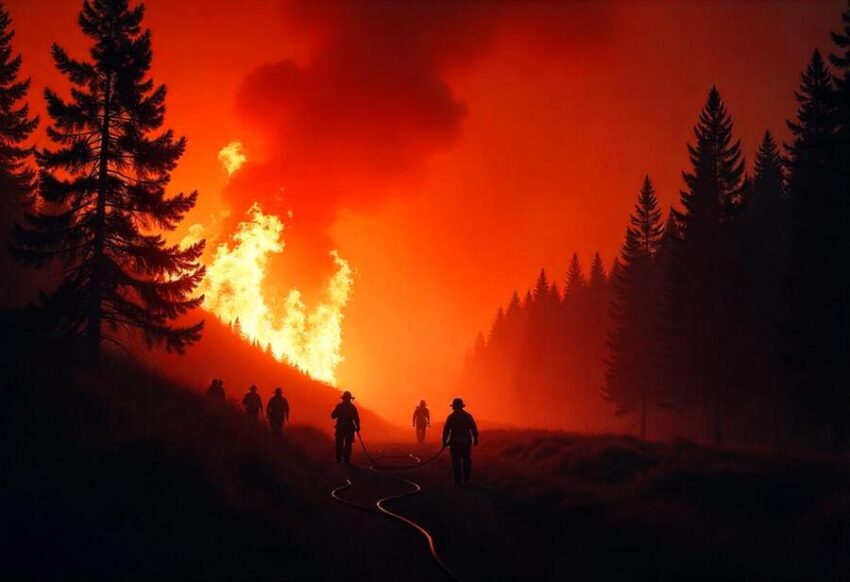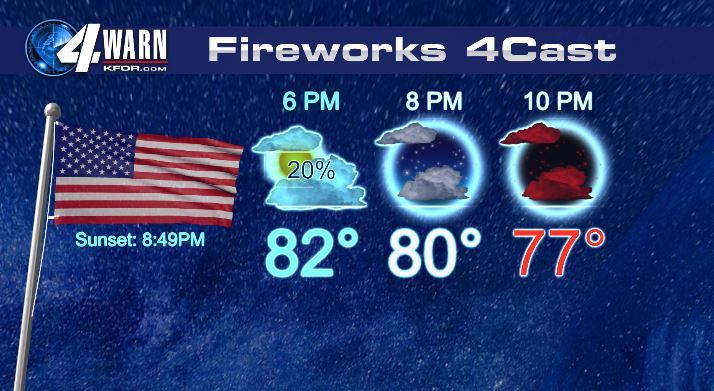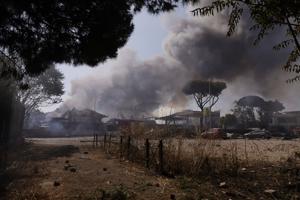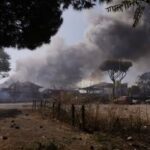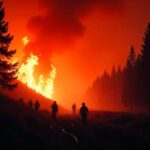Wildfires sweeping through Crete’s southern Ierapetra region have triggered a Greece travel emergency, forcing the evacuation of over 1,500 tourists and residents. The flames, intensified by powerful winds, have rapidly spread across forests and farmland, overwhelming local firefighting forces and prompting urgent mobile phone alerts from Greek authorities. With the fires threatening homes, resorts, and tourist zones, Greece’s Civil Protection Agency has mobilized aircraft and emergency crews around the clock. This situation has left travelers scrambling for safety and raised fresh concerns about the growing impact of climate-related disasters on Mediterranean tourism.
Tourists Evacuate as Wildfires Rage in Crete’s Ierapetra
Tourists and locals on the southern coast of Crete, particularly in the Ierapetra region, have been forced to evacuate as relentless wildfires engulf forested areas and farmland. Pushed by powerful winds, the fires have swept through parts of the island overnight and into Thursday morning, leaving behind scorched landscapes and widespread concern. More than 1,500 people have been evacuated from homes and tourist accommodations, with Greek emergency services working tirelessly to contain the disaster.
Flames Engulf Ierapetra Region: Firefighting Forces Mobilized
The southern coastal region of Ierapetra, renowned for its scenic charm and agricultural richness, is now under emergency response as wildfires continue to burn out of control. Firefighters, supported by over 10 aircraft conducting water drops, are combating the inferno amid gale-force winds that are fueling the flames and hampering containment efforts.
Local authorities have reported extensive damage to homes and property as hillside forests and agricultural fields catch fire. The Greek Fire Service, along with the Civil Protection Agency, has sent emergency alerts via mobile phones urging residents and tourists to evacuate promptly and not to return for belongings or attempt to save property, emphasizing safety over possessions.
Crete’s High Wildfire Risk: What Travelers Should Know
Crete is one of the most popular destinations in Greece, drawing millions of tourists annually. However, during the summer season—from April to October—the island, like much of southern Greece, is especially vulnerable to wildfires. The hot, dry Mediterranean climate, combined with strong seasonal winds, creates the perfect conditions for fires to ignite and spread rapidly.
According to the Greek Fire Service, the wildfire danger remained “very high” on Thursday for multiple regions across Crete and southern mainland Greece. In recent years, Greece has faced increasingly severe wildfire seasons, exacerbated by climate change and prolonged drought conditions. Although these incidents are not uncommon, the speed and intensity of the fires in Ierapetra have raised alarms both locally and internationally, particularly among travelers who currently find themselves on the island or are preparing to visit.
Is It Safe to Travel to Crete Right Now?
At present, there is no general travel ban or official advisory against visiting Crete. The United Kingdom’s Foreign, Commonwealth & Development Office (FCDO), along with other foreign ministries, has acknowledged the wildfire risk and advises tourists to remain informed and vigilant. Travelers are urged to register their mobile numbers with local authorities to receive emergency text alerts about fires near their location.
The Greek Civil Protection Agency also provides updated maps and risk-level bulletins, which are essential for planning day trips or excursions during wildfire-prone periods. Tourists are encouraged to avoid wooded areas or open fields, especially when winds are strong or the fire danger level is categorized as “extreme.”
Cancellations and Refunds: What Are Your Rights?
For travelers reconsidering or canceling their plans to visit Crete, the financial implications may be frustrating. Without an official “no-go” designation from your government, canceling a trip voluntarily due to wildfires is typically categorized as a “disinclination to travel.” In such cases, airlines, hotels, and tour operators are not obligated to offer refunds.
Travel insurance may also fall short in providing compensation. Most basic policies do not cover “loss of enjoyment,” such as being confined indoors or missing excursions due to fire-related disruption. However, travelers who purchased comprehensive plans with natural disaster or trip disruption clauses might be eligible for certain benefits if wildfires significantly impact their itinerary.
The only instances where travelers can automatically claim a refund or rebooking is if flights or hotel accommodations are directly canceled by providers due to the fire threat. Even in these situations, the compensation process can vary depending on the terms and conditions of each booking or insurance agreement.
What Should You Do If You’re Currently in Crete?
If you’re already in Crete, especially near affected areas like Ierapetra, it is vital to follow instructions from local authorities. Do not attempt to return to evacuated zones or drive through smoke-filled roads. Keep your mobile phone charged and set up to receive emergency alerts, and monitor local news, embassy updates, and official Greek government bulletins.
Hotels and resorts have also put emergency plans in place and are working with municipal authorities to guide guests to safety if evacuations are mandated. Most evacuation shelters are well-equipped and supported by humanitarian aid, ensuring that both residents and tourists are looked after.
Preparing for Future Travel: Stay Informed and Insured
If you have an upcoming trip to Crete, stay in close contact with your travel provider and monitor real-time updates from the Greek Civil Protection Agency and your country’s foreign office. Check whether your travel insurance includes natural disaster coverage and consider upgrading your policy if needed.
While Crete remains open for tourism, planning with flexibility and caution is essential during wildfire season. Booking refundable accommodations and flexible flights, keeping your documentation handy, and preparing for potential changes in your itinerary will help mitigate the risks.
A Broader Look: Greece’s Struggle with Wildfires
Greece, like many Mediterranean nations, is increasingly grappling with the consequences of hotter, drier summers. Wildfires have become a seasonal emergency, often straining national firefighting resources. From the mainland to islands like Rhodes, Evia, and Crete, large-scale blazes have caused evacuations, damaged ecosystems, and threatened tourism, one of the country’s most vital economic sectors.
Despite the danger, Greece continues to attract travelers with its unique blend of history, culture, natural beauty, and warm hospitality. Local communities are becoming more resilient, with enhanced emergency services, digital alert systems, and regional evacuation strategies. However, travelers must remain proactive and well-prepared, especially in peak summer months.




